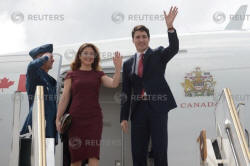U.S., Canada, Mexico sign trade deal after last-minute
brinkmanship
 Send a link to a friend
Send a link to a friend
 [November 30, 2018]
By Roberta Rampton [November 30, 2018]
By Roberta Rampton
BUENOS AIRES (Reuters) - The leaders of
Mexico, Canada and the United States signed a North American trade pact
on Friday after brinkmanship over the final details of the deal
continued through the eve of the signing.
They agreed on a deal in principle to govern the more than trillion
dollars of mutual trade after a year and a half of acrimonious
negotiations concluded with a late-night bargain just an hour before a
deadline on Sept. 30.
Since then, the three sides have bickered over the wording and the finer
points of the deal and still had not agreed just hours before officials
were due to sit down and sign it as the G20 summit kicks off in Buenos
Aires.

Legislators from the three countries still have to approve the pact,
officially known as the United States-Mexico-Canada Agreement (USMCA),
before it goes into effect and replaces the North American Free Trade
Agreement (NAFTA).
Canadian Prime Minister Justin Trudeau's spokesman only confirmed his
attendance late on Thursday. Before signing the deal he continued to
refer to as "the New NAFTA," Trudeau told Trump the two should continue
to work together to eliminate steel and aluminum tariffs.
Mexico's President Enrique Pena Nieto joined the ceremony on his last
day in office.
[to top of second column] |

Canada's Prime Minister Justin Trudeau and his spouse Sophie
Gregoire Trudeau wave as they arrive ahead of the G20 leaders summit
in Buenos Aires, Argentina November 29, 2018. Argentine G20/Handout
via REUTERS

Trump had vowed to revamp NAFTA during his 2016 presidential election campaign.
He threatened to tear it up and withdraw the U.S. completely at times during the
negotiation, which would have left trade between the three neighbors in
disarray.
Trump forced Canada and Mexico to renegotiate the 24-year-old agreement because
he said the existing pact encouraged U.S. companies to move jobs to low-wage
Mexico.
U.S. objections to Canada's protected internal market for dairy products was a
major challenge facing negotiators during the talks, and Trump repeatedly
demanded concessions and accused Canada of hurting U.S. farmers.
A side letter to the September agreement showed that Trump preserved the ability
to impose threatened 25 percent global tariffs on autos while largely exempting
passenger vehicles, pickup trucks and auto parts from Canada and Mexico.
(Reporting by Roberta Rampton and Caroline Stauffer in Buenos Aires and David
Ljunggren in Ottawa; Editing by Lisa Shumaker and Chizu Nomiyama)
[© 2018 Thomson Reuters. All rights
reserved.] Copyright 2018 Reuters. All rights reserved. This material may not be published,
broadcast, rewritten or redistributed.
Thompson Reuters is solely responsible for this content. |